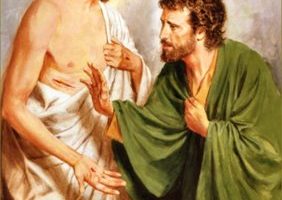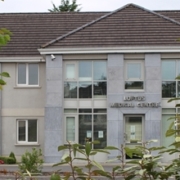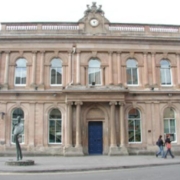The Gospel – 16th April 2023
Sunday, 16th April 2023
DIVINE MERCY SUNDAY
The Gospel
John 20:19-31
Eight days later, Jesus came again and stood among them.
In the evening of that same day, the first day of the week, the doors were closed in the room where the disciples were, for fear of the Jews. Jesus came and stood among them. He said to them, ‘Peace be with you’, and showed them his hands and his side. The disciples were filled with joy when they saw the Lord, and he said to them again, ‘Peace be with you.
‘As the Father sent me,
so am I sending you.’
After saying this he breathed on them and said:
‘Receive the Holy Spirit.
For those whose sins you forgive,
they are forgiven;
for those whose sins you retain,
they are retained.’
Thomas, called the Twin, who was one of the Twelve, was not with them when Jesus came. When the disciples said, ‘We have seen the Lord’, he answered, ‘Unless I see the holes that the nails made in his hands and can put my finger into the holes they made, and unless I can put my hand into his side, I refuse to believe.’ Eight days later the disciples were in the house again and Thomas was with them. The doors were closed, but Jesus came in and stood among them. ‘Peace be with you’ he said. Then he spoke to Thomas, ‘Put your finger here; look, here are my hands. Give me your hand; put it into my side. Doubt no longer but believe.’ Thomas replied, ‘My Lord and my God!’ Jesus said to him:
‘You believe because you can see me.
Happy are those who have not seen and yet believe.’
There were many other signs that Jesus worked and the disciples saw, but they are not recorded in this book. These are recorded so that you may believe that Jesus is the Christ, the Son of God, and that believing this you may have life through his name.
REFLECTION:-
We are very security conscious in these times. We lock everything we can. There was a time when people could leave their doors unlocked because they trusted everyone in the community. Those days are gone, unfortunately. The alarm business is booming. Fear and anxiety is much more prevalent than it used to be.
At the beginning of today’s gospel reading, we find the disciples closed off in a room out of fear. The religious and political authorities who were responsible for Jesus’ crucifixion might come after them next. The locked doors may have kept out Jesus’ enemies but they couldn’t keep out the risen Lord. According to the gospel reading, Jesus came and stood among them, without knocking on the door, without waiting to be let in. He was now alive with a new kind of life, and in that life he could come to his disciples wherever they were. A locked door was no obstacle to him. The disciples thought Jesus was dead and they presumed their following of him was over. In reality, it was only beginning. When Jesus stood among them, he first said to them, ‘Peace be with you’. He wanted them to know that he was at peace with them, in spite of the fact that they had abandoned him in the hour of his passion and death.
Having assured them that they were reconciled to him, he then empowered them to be agents of God’s reconciling love in the world. Breathing the Holy Spirit upon them, he sent them out to reveal God’s merciful love to all, ‘those whose sins you forgive, they are forgiven’. It is only those who deliberately reject God’s offer of merciful love whose sins will be retained.
In that opening scene of today’s gospel reading, none of the disciples are named. We are all being encouraged to see ourselves as belonging to that group. The way the risen Lord related to them is how he relates to us all. The Lord comes and stands amongst us, regardless of where we find ourselves. Even if we try to lock the Lord out of our lives, he comes to us anyway. He wants to be with us, to journey with us, to dwell within our hearts through the Holy Spirit. He always comes to us with his gift of peace, a peace the world cannot give. He comes to assure us that his love for us endures even when we fail him. He comes to recreate us through the Holy Spirit.
In the second scene of today’s gospel reading, the focus is on one disciple, Thomas. Yet, in many ways, he too represents us all. When the disciples were full of Easter joy, declaring to Thomas, ‘We have seen the Lord’, he couldn’t bring himself to believe their good news. He had been devastated once by the crucifixion of Jesus; he wasn’t going to have his hopes dashed again by wishful thinking. Unless very clear conditions were met, Thomas defiantly declares, ‘I refuse to believe’. Thomas’ doubts speak to our own doubts. There is always some element of doubt in our faith, because, as Saint Paul says in one of his letters, ‘now we see as in a mirror dimly, then we will see face to face’. It is only in eternity that we will see the Lord face to face. In this life our seeing the Lord with the eyes of faith will always be a seeing dimly. Thomas was on a journey towards Easter faith, but he was travelling that journey at a slower pace than the other disciples. Everyone’s journey towards faith is unique to them.
When the risen Lord appeared to the disciples a week later, this time with Thomas present, he did not rebuke Thomas for his refusal to believe the message of the other disciples. There was the same greeting from the Lord, ‘Peace by with you’, and an invitation to Thomas to doubt no longer but believe. The Lord always meets us where we are; he comes to us, as we are. Then, in response to the Lord’s greeting, the sceptical Thomas made one of the greatest confessions of faith in all four gospels, ‘My Lord and my God’. Scepticism and deep faith can often be found in one and the same person.
PRAYER:-
My Lord, You are The Divine Mercy, the source of all grace and the Bestower of this grace in superabundance. I thank You for the infinity of Your generosity and pray that my soul will be more fully disposed to receive You. Please stretch the capacity of my soul through my ongoing journey of purification and conversion so that I will receive all that You wish to bestow. Jesus, I trust in You


 William G. Henry & Co., Solicitors
William G. Henry & Co., Solicitors Stewart Fuel Oils, Boyle
Stewart Fuel Oils, Boyle







